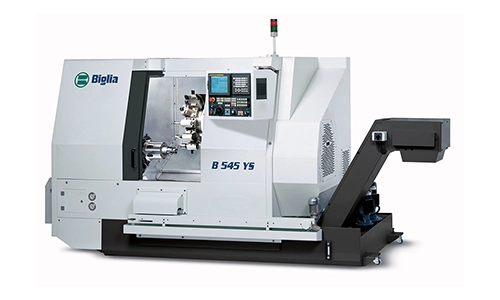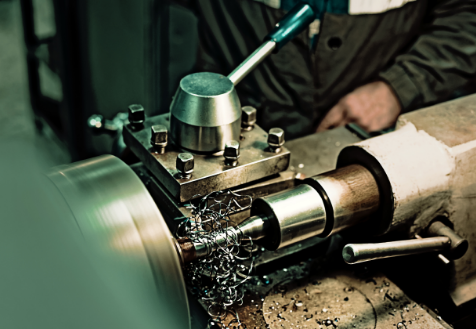In recent years, digitalization has revolutionized various industrial sectors, and mechanical processing is no exception. The introduction of new technologies and digital solutions has radically changed the way many production processes are carried out, improving the efficiency, precision, and flexibility of operations.
In this article, we will explore how digitalization has influenced the mechanical processing sector and how ALCA S.r.l. is leveraging these innovations to offer high-quality solutions.
The Evolution of Mechanical Processing in the Digital Era
Before the advent of digitalization, mechanical processing relied primarily on manual processes and direct control machines. Operations required a high level of expertise from operators and were often subject to human error, which could negatively impact the quality and precision of finished products. However, the arrival of digital technologies opened up new possibilities, allowing companies to automate many processes and significantly reduce the margin for error.
With the introduction of computer numerical control (CNC) machines, mechanical processing has become much more precise and repeatable. CNC systems are capable of performing complex operations with minimal error, enabling companies to work with complex materials and produce components with very tight tolerances.
But that’s not all: the integration of simulation software, data network connections, and artificial intelligence (AI) has made production even smarter and more flexible.
How Digitalization Has Changed Mechanical Processing
Digitalization has introduced several tools and technologies that have completely transformed mechanical processing. Let’s look at some of the main changes that have taken place:
- Process Automation: Automation is one of the key aspects of digitalization in mechanical processing. Thanks to the use of robots and automated systems, it is now possible to perform complex operations autonomously, with speed and precision that were unimaginable just a few years ago. This not only improves the quality of the final product but also optimizes production times, reducing waste and increasing efficiency.
- Real-Time Monitoring: Digitalization has enabled the ability to monitor every phase of the production process in real-time. Through sensors and connected devices, data can be collected on parameters such as temperature, speed, pressure, and tool wear, allowing operators to intervene promptly in case of anomalies. This reduces machine downtime and ensures continuous production without interruptions.
- Predictive Maintenance: Another significant advantage of digitalization is the introduction of predictive maintenance. By analyzing the data collected during production, it is possible to predict when a machine might need maintenance before a failure occurs. This approach not only reduces downtime but also extends the useful life of equipment and avoids costly repairs.
- Digital Design and Simulation: Today, thanks to computer-aided design (CAD) and simulation software, it is possible to create 3D models of components and virtually test their behavior before production begins. This allows for design optimization, reduced prototyping costs, and improved product quality. Moreover, the integration with digital production systems enables a smoother and faster transition from design to manufacturing.
Technologies Used by ALCA S.r.l.
ALCA S.r.l. has always been at the forefront of mechanical processing, and the introduction of digitalization was a natural step to further improve its production processes. Let’s look at some of the digital technologies adopted by the company:
- Advanced CNC Machines: ALCA uses state-of-the-art CNC machines capable of performing complex operations with millimetric precision. These machines are programmed to work with materials such as steel, aluminum, and other metals with high repeatability, ensuring consistent, high-quality results.
- Design and Simulation Software: The company relies on sophisticated 3D design tools to create digital models of the components to be produced. This allows for the simulation of part behavior in real-world conditions, optimizing the design and minimizing the need for modifications during production.
- Automated Quality Control: ALCA has implemented automated quality control systems that monitor every phase of the production process. Through the use of sensors and machine vision systems, defects and imperfections can be detected in real-time, ensuring that each part meets the high-quality standards required.
- Predictive Maintenance and Data Management: By using advanced data analysis software, ALCA can plan maintenance interventions predictively, reducing downtime and extending equipment life. Data collection and analysis are essential to ensure that every production phase is optimized and to identify areas for improvement.
The Benefits of Digitalization for ALCA’s Customers
ALCA’s adoption of digitalization not only benefits the company but also its customers. Thanks to more efficient and precise processes, ALCA is able to offer:
- Faster Delivery Times: Automation and real-time monitoring reduce production times, ensuring timely deliveries even for complex projects.
- Superior Quality: Thanks to automated quality control systems and the precision of CNC machines, customers can be confident they are receiving products that meet the highest quality standards.
- Flexibility: The ability to quickly adapt production processes due to digitalization allows ALCA to respond swiftly to customer needs, whether for small or large production runs.
Contact ALCA S.r.l. for Advanced Mechanical Processing Solutions
If your company is looking for a reliable partner for mechanical processing, ALCA S.r.l. is the right choice. Thanks to the digitalization of its production processes, ALCA can offer customized solutions, fast delivery times, and superior quality.
Contact us today to learn how we can help improve your production with the most advanced technologies available on the market.





